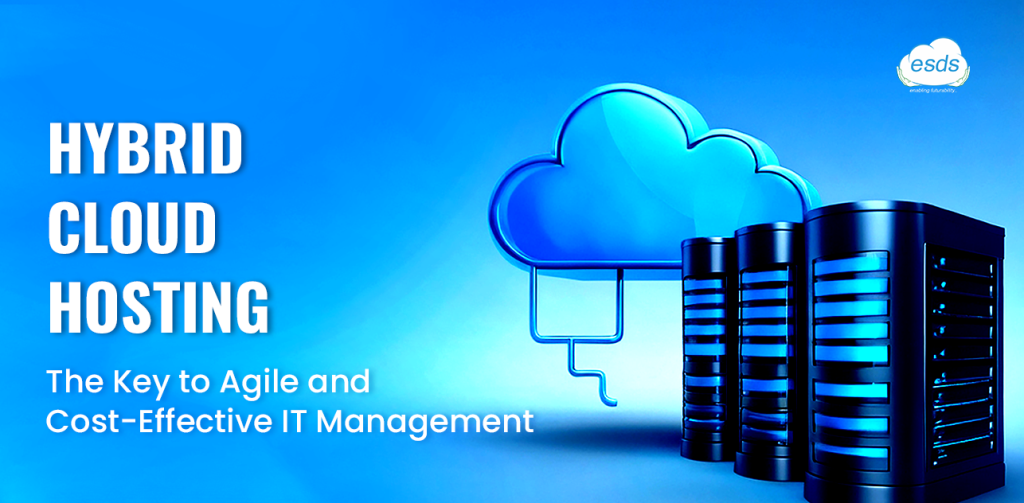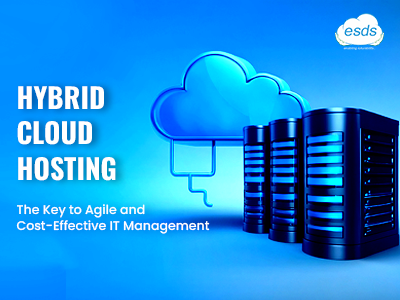Hybrid Cloud Hosting: The Key to Agile and Cost-Effective IT Management
Presently, cloud hosting companies are looking for educational solutions aimed at improving their IT systems. The inventive technology behind hybrid cloud hosting is increasing in popularity each day. It merges both public and private clouds creating an easy-to-use, convenient, and cost-effective means of running businesses. The blog will bring out the good sides of hybrid cloud hosting with real examples of how to use it and set it up.

Understanding Hybrid Cloud Hosting
Hybrid cloud hosting model is represented by the integration of hybrid cloud services, public cloud services, private cloud services as well as on-premise infrastructure within a single agile computing environment. With this arrangement, organizations can scale using public clouds for flexibility and cost-effectiveness while maintaining controls and security via their private clouds. Public and private clouds are two sides of the same coin when they function together providing a taste of the best worlds. This technology can be a powerful tool for boosting operational efficiency and increasing business adaptability.
The main advantages of Hybrid Cloud Hosting
- Flexibility and Scalability: The hybrid cloud hosting can be increased or reduced as the demand of the company dictates. To maintain a critical database and applications on their private clouds, corporations use public cloud resources to manage the flow of high traffic and big workloads.
- Cost Efficiency: Actually, both the public as well as private clouds help companies to use their resources efficiently by using them sparingly. Due to the frequent changes in workload levels that it has to handle a public cloud is very convenient thus you save a lot on expensive furniture. Unlike in public-supplied clouds, private clouds and businesses premised hence their data will never migrate.
- Increased security and compliance: Limiting storage of some information in your private cloud enables adherence to industry regulations and standards set across the board. This means that you can utilize a public cloud with lower security only if required and when it’s most definitely important for you to do so.
- Business Continuity: The hybrid cloud hosting is at the top of business continuity when it comes to disaster recovery and uninterrupted operation. By making data and applications copy across the public and private cloud spaces, businesses can encounter larger reductions in downtime and recuperating speed in case of failures.
Common terms for hybrid cloud hosting
- Seasonal increases in business: This means that during festive seasons like Christmas, when e-commerce volumes are generally higher than at any other time, hybrid cloud hosting would be very beneficial. Nevertheless, it is the public cloud that accommodates leaks while the private one handles system operations.
- Advancement and Testing: The developers’ team can use a public cloud for testing purposes without affecting private clout resources. When ready for deployment, they could be shifted to a safer place in a closed space.
- Data Processing and Analytics: Enabling organizations to work with big datasets securely through computation power based on Public Clouds while confidential data can reside within Private Clouds where security is guaranteed
Best Practices for Implementing Hybrid Cloud Hosting
- Assess Workload: Understanding the workload done on public clouds that are important to business and those carried out privately is integral to hybrid cloud operations. The following areas need to be studied:
- Security: Certain types of information like financial records, customer databases, as well as company-specific files should be residing in a private cloud with tighter security measures.
- Regulatory Compliance: Sectors such as health care or finance have very strict requirements concerning data storage and management. This means that tasks must be designed to ensure that work locations conform to these provisions while facilities match these standards.
- Performance: It becomes evident from speed-related and latently dependent duties that private clouds and on-premises infrastructure can deliver the best performances. Public cloud is ideal for workloads exhibiting varying requirements like for instance web applications during peak hours.
- Ensure Seamless Integration: Building a hybrid cloud environment needs to connect public and private clouds to work together without any hassles. Set up of integration tools and platforms that make integration of work set out are enough:
- Unified Management Platforms: Utilizing management systems that can offer one display of all controlled resources among public and private clouds can be adopted. This simplifies the process of managing and monitoring the system.
- APIs and Middleware: Enable communication and data transfer between clouds in the same cloud environment through APIs and middleware. Make sure that the tools used conform to the set standards.
- Data Synchronisation: Ensure that data synchronization across public and private clouds is made in such a way as to maintain the integrity and availability of the data. To make all the data up to date in the version presently used, let’s take data replication and synchronizing tools.
- Implement Strong Security Measures: What we are now considering is the potential of security, which has virtually expanded evolving with the hybrid cloud setup. The implementation of intense security measures follows the below-mentioned steps:
- Encryption: Encrypt both the data in rest and transit to the cloud to protect all the unauthorized accesses. Avail of encryption protocols that are standard for the industry, including the update of encryption keys regularly.
- Access Controls: One of the main ways how security could be ensured is through thorough access controlling, preventing only people who are several levels authorized from accessing the data or resources. MFA and RBAC are the best tools to secure the system.
- Security Audits: Regular security audits ought to be performed to detect potential risks and ascertain full compliance with security policies and standards. The use of automated tools to keep tabs on security threats and irregular activities should be one of the main goals.
- Security Training: One of the new security protocols that has been underway is the provision of regular security training for employees, who are constantly on the lookout for best practices and potential security threats. Foster a “security comes first” mentality in a company.
4. Monitor and Optimize Performance:
It is important to have constant surveillance and optimization of the hybrid cloud infrastructure to find the best balance between cost and performance:
- Performance Monitoring Tools: Application and infrastructure are monitored using software performance monitoring to monitor metrics such as response time, throughput, and resource utilization. Additionally, the whole application and infrastructure are monitored in real-time.
- Resource Allocation: Auto-scaling in public clouds can be used to create a dynamically adjusted supply of resources, be it with the shift in demand of the service or product, while private cloud resources are used efficiently.
- Cost Management: Agreed to the cost and manage them to the hybrid cloud use expenses. Look for solutions with cost management tools to find savings and avoid unnecessary spending. Create usage policies for resources that will be of high efficiency and decrease costs.
- Regular Reviews: Regularly analyze and check how the hybrid cloud is set up is still effective and meets the needs of the company. Regulations, IT services, and the intake of the new technology will all require some adjustments in strategies and configurations.
Conclusion
Hybrid cloud hosting is the most potent, hassle-free, and secure digital tool for any business. Using the world’s fastest and most secure network, companies can merge public and private clouds and as a result, can achieve the best service performance at a minimal cost.
At ESDS we offer hybrid cloud hosting services that are tailored to your business. Our solutions provide seamless integration, strong security, and continuous performance monitoring so your IT infrastructure is always optimized. As businesses evolve ESDS will evolve too through our hybrid cloud hosting services.
- Why the BFSI Industry Needs GPUaaS Now - October 31, 2025
- The Future of VAPT Services: AI, Bug Bounties, and Beyond - June 20, 2025
- Government Community Cloud: The Backbone of Modern Public Infrastructure - April 7, 2025
